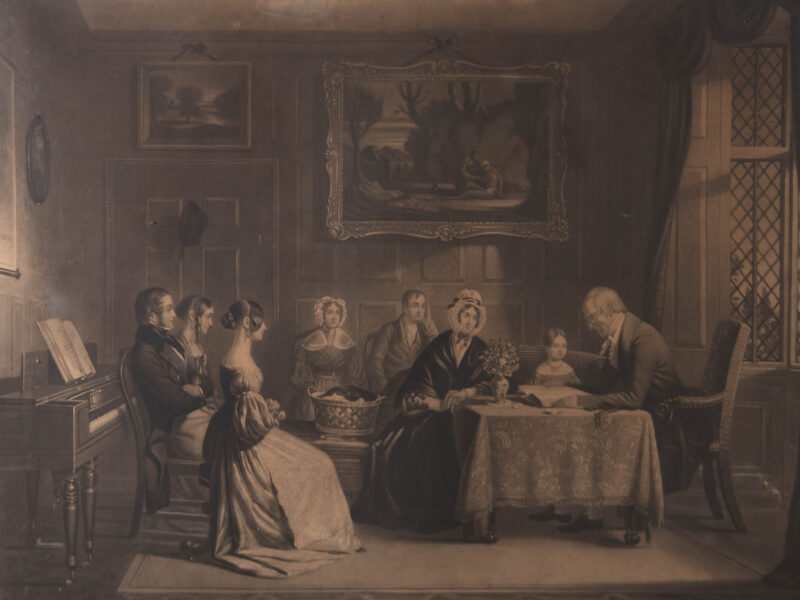Reverence is a humble openness to the infinite depth and mystery of existence. It is the soul’s proper posture toward the reality presented before it. That no man can plumb the depths of meaning in the very fact of existence is a pre-requisite conviction of reverence. “We therefore see these things which Thou madest, because they are: but they are, because Thou seest them,” Saint Augustine writes.[2] God’s sight declares the “very good” of His creation—the inexhaustible meaning, beauty, and value in all existent things. The irreverent man attempts to lustfully dominate and subdue the reality given to him. He, in his pride, “suspects nothing of the breadth and the depth of the world, of the…fulness of values that are bespoken by every ray of the sun and every plant.”[3] His irreverence is most pronounced in his posture to the highest value, to God Himself. Like Uzziah, he strives in vain to control and grasp the sacred. The opposite of this prideful disposition is manifested in the humble response of the Blessed Virgin: “Be it done unto me according to thy word.”[4] Her posture of reception is beautifully captured in Botticelli’s The Annunciation: kneeling, head bowed, and arms gracefully folded.
A corollary truth inherent in the spirit of reverence is the objective nature of the world of values. Values have a hierarchy and pattern, whose source and center is He who “is before all things, and by whom all things consist.”[5] Because values are objective, they evoke an objective reply. By the very reception of a value, a commensurate response is called from us. For example, the objective value of femininity and its beauty “demands” something from men. An observant reverence to femininity evokes a sacrifice from men in their unique value as men. Chivalrous masculinity is defined by this reverential self-offering to the feminine. This has taken various forms that in present society are seen as antiquated and are therefore fading away. Holding doors, standing when a woman enters, carrying her bags, and offering her protection are traditional, reverential responses to the value of femininity—to its beauty and grace.
Consequently, to address the world of values properly, man firstly must be attentive. The inattentive man cannot receive because his life aimlessly scrolls by, unimpacted by the meaning of values. He is, whether conscious of it or not, “altogether lighter than vanity itself.”[6] Josef Pieper, another twentieth-century Roman Catholic philosopher, warned that in the modern era the greatest danger to Christianity would not be conscious unbelief, but radical inattentiveness and slothfulness of soul (acedia).[7] A banal therapeutic deism would overtake Christianity, not a strong-minded and articulate paganism. Pieper writes, referencing the philosopher Gabriel Marcel, that “the conditions of modern life not only favor but almost compel such inattention, which makes belief in practice rather improbable.”[8] Modern digital technology has furnished the vicious means for a pervasive inattentiveness, and consequentially, irreverence. The forms of the internet, social media, and the smartphone offer an infinite number of sensuous distractions—with more personalized search results, faster performance, and a longer battery life every year. Endless scrolling, infinite entertainment streaming options, and the omnipresent “noise” of modern culture all form and direct man toward inattentiveness. The reverent man must firstly be the attentive man, he must be him who “takes every thought captive and brings it into obedience” of the world of values.[9]The openness of reverence to the deep, mysterious, and true nature of existence enables genuine worship. Without reverence, man is unable to give himself freely, he does not recognize “that the world of being is greater than he is, that he is not the Lord who can do with things as He likes, and that he must learn from being, not the other way around.”[10] Because of the objectiveness of values, man’s response is not a subjective, preferential choice. The psalmist declares, “Kiss the son lest he be angry, and ye perish from the way.”[11] Worship unfolds from a proper reception of the nature and hierarchy of values. Chaos and disharmony emerge from a misperception of values and an irreverent worship, as one “kicks against the goads” of the world of values.[12]
Hildebrand repeatedly emphasizes that man, unique among created beings, is given a free choice to perceive and respond to values—thereby reaching mankind’s “ultimate dignity,” which is to “consciously adore and glorify God.”[13] By this free response man communes with the world of values and is thereby transfigured into the image of the God-man, Jesus Christ. However, this choice is not eternally available, and all men will with reverence worship at the end of days. This worship will even take an objective, liturgical form, as “At the name of Jesus every knee should bow, of those in heaven, and of those on earth, and of those under the earth, and that every tongue should confess that Jesus Christ is Lord.” [14] Man’s choice in no way produces the world of values, it is an obedient response that produces a new reality within him. Modern irreverence is premised on the notion that there are no objective values and therefore forms of reverence are subjective, oppressive human miscreations.
Reverent worship ought to permeate the entirety of man’s being—his “heart, soul, mind, and strength.”[15] Traditional liturgies are infused with the reality of this total reverence. The slight bow as the cross processes forward, kneeling during prayer, and genuflection during the creed are a few examples of how the church’s liturgy imparts the spirit of reverence to the man who submits himself to it. Hildebrand argues that in the reverential liturgy of the church, the spirit of attention, discretion, and true awakedness animate every facet.[16] The church presents herself a living sacrifice, “our souls and bodies,” in, through, and with Christ.[17] The accompanying forms of reverence are an effectual response to this true reality, not an empty imposition of a false reality. “Take your sandals off your feet, for the ground on which you stand is holy ground.”[18] Moses did not remove his sandals out of reverence for a spiritually empty, vulgar, merely physically constituted bush. So too the church does not bow, sign, or kneel out of convenience, nostalgia, or to receive a unique blessing. She kneels and adores in humble response to the fire of the spirit descending afresh on her altar. The church lifts her voice to join a heavenly liturgy, not to create a novel and separate one here below. “Therefore with angels and archangels, and all the company of heaven we laud and magnify thy holy name, evermore praising thee and saying, HOLY, HOLY, HOLY.”[19]The traditional Anglican liturgies display this reverential pattern. The opening confession of the daily offices proceeds from the nature of the divine (“Almighty and most merciful Father”) to the proper response of man (“Restore thou those who are penitent” and “That we may hereafter live a godly, righteous, and sober life”).[20] The offices move from this highest reality of God’s holiness to the particulars of church, state, and local community in the concluding prayers. All reality is transfigured by Christ, as is exemplified in the Benedicite, where the natural world, heavenly hosts, and souls of the righteous are called upon to praise and magnify the Lord. The church, every time it approaches the sacred altar, beseeches the Almighty that all members present may “with meek heart and due reverence” receive the holy Word of God. A consequence, though importantly not the aim of the liturgy, is that the church is transformed into the reverent and holy man by its communion with the ultimate value. He is attentive, humble, and open to the true nature of all creation. He responds with appropriate service and self-offering, with worship that is due to the nature of everything received. This man is of course nothing else but the complete body of Christ (the totus Christus).
“All things come of thee, and of thine own have we given thee.”[21] The reverent man returns his life to God through Christ, in a mode proper to the value of God and of man made in His image. All those who worship in “spirit and in truth” must first possess reverence—they must be open and surrender to the world of values.[22] Though it is against the culture of the present age, the Christian man must stand firm in believing “that the mind is below truth, not above it, and is bound, not to descant upon it, but to venerate it.”[23] This is done day by day, Sunday by Sunday, through participation in the reverential liturgy of the church. The Christian must decrease—his prideful trust in knowledge and vain striving to dominate values removed—for God to increase and dwell in Him. Thus, we are taught “in returning and rest ye shall be saved, in quietness and confidence shall be your strength.”[24] For only the reverent man can quiet himself and humbly listen to the world of values. He listens and hears the call of the good shepherd in all the values so richly bestowed on him through creation and responds accordingly in the glorious meeting of heaven and earth in the church.
Notes
- Dietrich von Hildebrand, The Art of Living, (Steubenville: Hildebrand Press, 2017), 3. ↑
- Saint Augustine, The Confessions of Saint Augustine, trans. E.B. Pusey, (Grand Rapids: Christian Classics Ethereal Library, 1999), Bk.13, Ch.38., 203. ↑
- Hildebrand, The Art of Living, 4. ↑
- Luke 1:38, KJV. ↑
- Colossians 1:17, KJV. ↑
- Psalm 62:9, Coverdale. ↑
- Josef Pieper, Faith, Hope, Love, (San Fransico: Ignatius Press, 2012), 72. ↑
- Josef Pieper, Faith, Hope, Love, 64. ↑
- 2 Corinthians 10:5, KJV. ↑
- Hildebrand, The Art of Living, 6. ↑
- Psalm 2:12, KJV. ↑
- Acts 26:14, ESV. ↑
- Dietrich von Hildebrand, Liturgy and Personality, (Steubenville: Hildebrand Press, 2016), 8. ↑
- Philippians 2:10-11, KJV. ↑
- Mark 12:30, KJV. ↑
- Hildebrand, Liturgy and Personality, 111. ↑
- Various liturgies contain this proclamation, this example taken from the 1662 BCP. ↑
- Exodus 3:5, ESV. ↑
- Various liturgies have a form of this exultation, including the Anglican BCP, the Divine Liturgy of St. John Chrysostom, and the Roman rites. ↑
- Taken from the 1928 BCP. ↑
- 1 Chronicles 29:14, KJV. ↑
- John 4:23, KJV. ↑
- John Henry Newman, An Essay on the Development of Christian Doctrine, 6th Edition, (Notre Dame: Notre Dame Press), 358. ↑
- Isaiah 30:15, KJV. ↑





'The Posture of Reverence' has no comments
Be the first to comment this post!